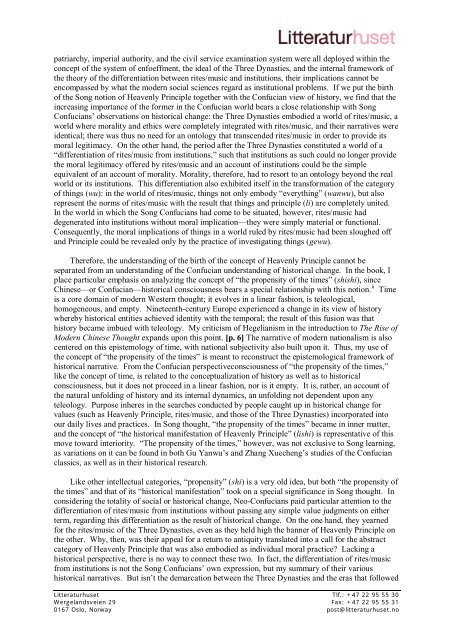20 2011 Opening speech by Prof. Wang Hui ... - Litteraturhuset
20 2011 Opening speech by Prof. Wang Hui ... - Litteraturhuset
20 2011 Opening speech by Prof. Wang Hui ... - Litteraturhuset
You also want an ePaper? Increase the reach of your titles
YUMPU automatically turns print PDFs into web optimized ePapers that Google loves.
patriarchy, imperial authority, and the civil service examination system were all deployed within theconcept of the system of enfoeffment, the ideal of the Three Dynasties, and the internal framework ofthe theory of the differentiation between rites/music and institutions, their implications cannot beencompassed <strong>by</strong> what the modern social sciences regard as institutional problems. If we put the birthof the Song notion of Heavenly Principle together with the Confucian view of history, we find that theincreasing importance of the former in the Confucian world bears a close relationship with SongConfucians’ observations on historical change: the Three Dynasties embodied a world of rites/music, aworld where morality and ethics were completely integrated with rites/music, and their narratives wereidentical; there was thus no need for an ontology that transcended rites/music in order to provide itsmoral legitimacy. On the other hand, the period after the Three Dynasties constituted a world of a“differentiation of rites/music from institutions,” such that institutions as such could no longer providethe moral legitimacy offered <strong>by</strong> rites/music and an account of institutions could be the simpleequivalent of an account of morality. Morality, therefore, had to resort to an ontology beyond the realworld or its institutions. This differentiation also exhibited itself in the transformation of the categoryof things (wu): in the world of rites/music, things not only embody “everything” (wanwu), but alsorepresent the norms of rites/music with the result that things and principle (li) are completely united.In the world in which the Song Confucians had come to be situated, however, rites/music haddegenerated into institutions without moral implication—they were simply material or functional.Consequently, the moral implications of things in a world ruled <strong>by</strong> rites/music had been sloughed offand Principle could be revealed only <strong>by</strong> the practice of investigating things (gewu).Therefore, the understanding of the birth of the concept of Heavenly Principle cannot beseparated from an understanding of the Confucian understanding of historical change. In the book, Iplace particular emphasis on analyzing the concept of “the propensity of the times” (shishi), sinceChinese—or Confucian—historical consciousness bears a special relationship with this notion. ii Timeis a core domain of modern Western thought; it evolves in a linear fashion, is teleological,homogeneous, and empty. Nineteenth-century Europe experienced a change in its view of historywhere<strong>by</strong> historical entities achieved identity with the temporal; the result of this fusion was thathistory became imbued with teleology. My criticism of Hegelianism in the introduction to The Rise ofModern Chinese Thought expands upon this point. [p. 6] The narrative of modern nationalism is alsocentered on this epistemology of time, with national subjectivity also built upon it. Thus, my use ofthe concept of “the propensity of the times” is meant to reconstruct the epistemological framework ofhistorical narrative. From the Confucian perspectiveconsciousness of “the propensity of the times,”like the concept of time, is related to the conceptualization of history as well as to historicalconsciousness, but it does not proceed in a linear fashion, nor is it empty. It is, rather, an account ofthe natural unfolding of history and its internal dynamics, an unfolding not dependent upon anyteleology. Purpose inheres in the searches conducted <strong>by</strong> people caught up in historical change forvalues (such as Heavenly Principle, rites/music, and those of the Three Dynasties) incorporated intoour daily lives and practices. In Song thought, “the propensity of the times” became in inner matter,and the concept of “the historical manifestation of Heavenly Principle” (lishi) is representative of thismove toward interiority. “The propensity of the times,” however, was not exclusive to Song learning,as variations on it can be found in both Gu Yanwu’s and Zhang Xuecheng’s studies of the Confucianclassics, as well as in their historical research.Like other intellectual categories, “propensity” (shi) is a very old idea, but both “the propensity ofthe times” and that of its “historical manifestation” took on a special significance in Song thought. Inconsidering the totality of social or historical change, Neo-Confucians paid particular attention to thedifferentiation of rites/music from institutions without passing any simple value judgments on eitherterm, regarding this differentiation as the result of historical change. On the one hand, they yearnedfor the rites/music of the Three Dynasties, even as they held high the banner of Heavenly Principle onthe other. Why, then, was their appeal for a return to antiquity translated into a call for the abstractcategory of Heavenly Principle that was also embodied as individual moral practice? Lacking ahistorical perspective, there is no way to connect these two. In fact, the differentiation of rites/musicfrom institutions is not the Song Confucians’ own expression, but my summary of their varioushistorical narratives. But isn’t the demarcation between the Three Dynasties and the eras that followed<strong>Litteraturhuset</strong> Tlf.: +47 22 95 55 30Wergelandsveien 29 Fax: +47 22 95 55 310167 Oslo, Norway post@litteraturhuset.no



